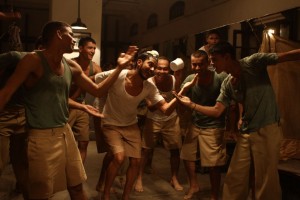 Indian cinema’s leading man Farhan Akhtar plays it tough in his new film Bhaag Milkha Bhaag, which tells the fabled tale of India’s track hero Milkha Singh, releasing on 12th July 2013. Commenting on the film, Farhan Akhtar said, “I’m very excited about this film. As an actor, it was an immense honour to play a living legend and Indian hero that is Milkha Singh. I am so proud of the film, and I hope, in my humble attempt, I have done justice to Milkha and his achievements. For me playing this character was a gratifying and humbling experience.”
Indian cinema’s leading man Farhan Akhtar plays it tough in his new film Bhaag Milkha Bhaag, which tells the fabled tale of India’s track hero Milkha Singh, releasing on 12th July 2013. Commenting on the film, Farhan Akhtar said, “I’m very excited about this film. As an actor, it was an immense honour to play a living legend and Indian hero that is Milkha Singh. I am so proud of the film, and I hope, in my humble attempt, I have done justice to Milkha and his achievements. For me playing this character was a gratifying and humbling experience.”
For the scenes of Milkha Singh’s service in the Indian Army, Farhan Akhtar had to take it to the next level. The young Milkha entered the army as a boy and learns some of life’s most important lessons from his ustaad (teacher) assigned to his platoon, expertly played by Prakash Raj. The subedaar (lieutenant) directs and instills courage into Milkha, developing his human spirit. It is during his army days that Milkha learns the skills of perseverance, hard work and discipline, which stand him in good stead when he goes on to become an Olympic athlete.
The pivotal army scenes were shot at the prestigious Rajputana Rifles Regimental Centre (RRRC), in the high-security cantonment area of Delhi. To assume the mantle of his character, Prakash Raj underwent a rigorous training programme, and was coached by Jawans to get a deeper insight into his role.
Continuing with the army theme, the makers of the film have released a third song from its eclectic soundtrack. ‘Maston Ka Jhund’ is a perky number, which gives us an insight into Milkha Singh’s life as a military man and his associations with his army mates. Farhan Akhtar filmed the video with 46 real-life military men to bring the emotionally stirring song to life and add authenticity.
Check out the video
http://youtu.be/KRTidmLllIE
Bhaag Milkha Bhaag tells the inspirational story of Indian athlete Milkha Singh, aka ‘The Flying Sikh’, whose life is a portrait of professional triumph over personal tragedy.
Many recall Milkha Singh as a famous athlete who infamously lost the penultimate race of his life – the 400 meter finals at the Rome Olympics. An formidable runner, Milkha Singh had an awe-inspiring 96.5 percent winning ratio.
The film attempts to understand a catastrophic loss that was deemed a sure victory and explores through the darkness of disgrace Milkha Singh’s redemption and catharsis that came when he confronted his past.
Bhaag Milkha Bhaag is produced by Viacom18 Motion Pictures and ROMP Pictures. Reliance Entertainment releases Bhaag Milkha Bhaag in cinemas internationally on 12th July 2013.
‘Milkha Singh’- for some the name evokes a faint memory from the pages of history. All that is most remembered is that Milkha Singh, hailed as the Flying Sikh, was a famous athlete who infamously lost the penultimate race of his life. “The one who lost the 400 meters finals at the Rome Olympics” is an involuntary response when the name Milkha Singh is mentioned. The film attempts to understand a catastrophic loss that was deemed a sure victory and explores through the darkness of disgrace; Milkha’s redemption, the redemption and catharsis that come when he confronts his past.
Milkha ironically finds himself in a place wherein he had lost his all – Pakistan – a place where he witnessed the bloody massacre of his entire family. The demons hidden in some dark corner of his consciousness come alive. This iridescent tale winds through the plagues of a bloody civil war, a lost childhood, homelessness and petty crime to victories hard won and easily lost. It draws an intricate image of human trials, setbacks and fate leveraged against the sheer power of will. He evocatively illustrates that true victory lies in racing with one’s troubles and not in running away from them. Milkha flies, falls and rises, bruising his soul but not his will to survive. Milkha Singh the world champion in 400 meters lost the most important race of his life – the 1960 Rome Olympics – but won in LIFE.










